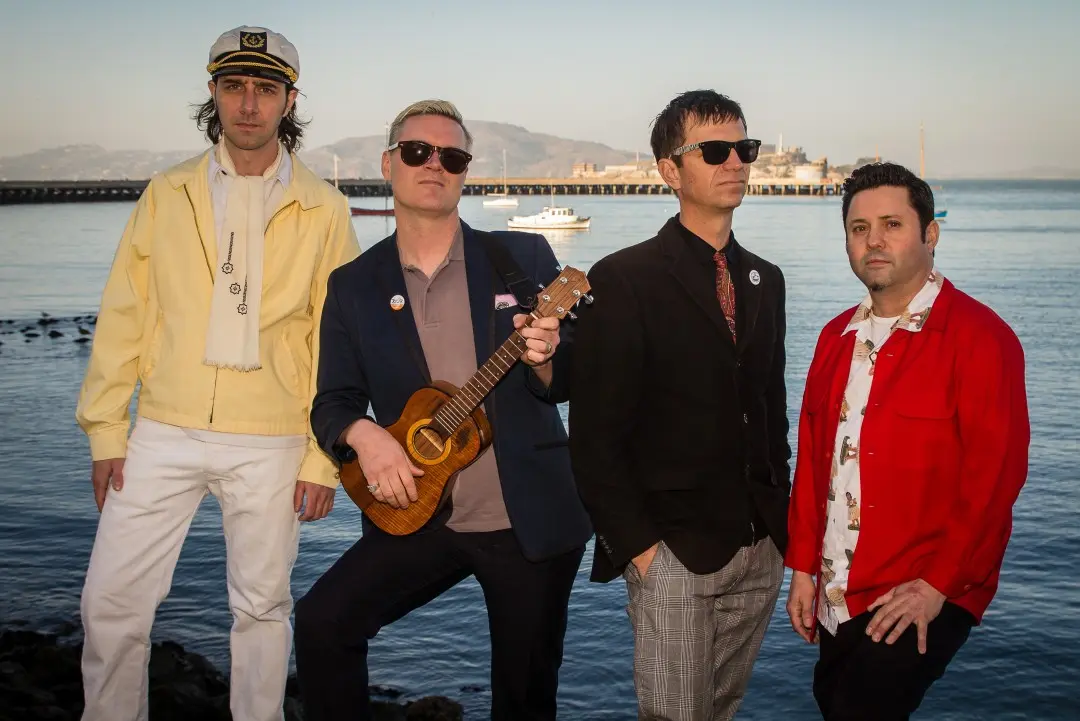Spike Slawson's Uke-Hunt is kicking off an East Coast tour tomorrow evening in Quebec CIty. It'll include several shows in la belle province along with gigs Ontario, New York, Rhode Island, and Pennsylvania. Toronto-based writer Graham Isador caught up with Spike for to chat about the ukulele-driven band, his recent work with Me First and The Gimme Gimmes, and more.
Uke-Hunt
Spike Slawson, best known as the frontman for the supergroup cover act Me First and The Gimmes Gimmes, has been a staple of the punk scene for as long as I can remember. The first time I heard Slawson’s vocals were on a rendition of "Science Fiction/Double Feature" I downloaded off Napster. The track had been mislabeled and while the vocals certainly didn’t sound like Deryck Whibley, I fully believed I was listening to Sum 41. After being corrected (and laughed at) by my local record store employee I was pointed toward Are a Drag and fell in love with the record. The Gimmies also pointed me towards all of the Fat comps that served as a soundtrack for my early adolescence.
Over the years I caught the Gimmies on a handful of occasions. Friends and I would get drunk and sing-a-long to the hits while seeing the band. While the shows certainly didn’t reinvent the concert-going experience, dollar for dollar they always delivered a great time. Still watching Spike blare through the back catalogues of monster artists always made me wonder: was playing in a cover band artistically fulfilling? More recently I’ve also been thinking a lot what it is to make work out of other people’s voices.
Slawson is about to embark on a tour with his band Uke-Hunt. Uke-Hunt follows a similar format to the Gimmes – Spike and his backing band are still playing covers – the approach sees a mellower sound with, obviously, a ukulele lead. Ahead of the tour I sat down for a quick interview talking about his bands and had a playfully contentious back and forth. Read it below.
Graham Isador: Can you talk to me a bit about the origins of Uke-Hunt? What made this different than what you were doing with the Gimmies and what was the decision to pick up a ukulele?
Spike Slawson: The moment I put the words "uke" and "hunt" together, I knew that I had finally, inadvertently discovered a message that I wanted to share with the world.
One of the things I’ve always admired about your work is the ability to step slightly outside close confines of how people define punk. Is there ever any worry of how playing tunes orchestrated on the Uke might be perceived by other people? Were you worried what people might think?
Some people seem to worry more about their scene or their music being co-opted by mainstream consumer culture than about the strangely conservative, traditionalist forces that, consciously or not, want to hold vibrant, innovative scenes such as punk rooted in some imagined past that is irrelevant to their time and circumstances. I try not to worry about what those people think.
I worry what people think pretty much constantly. It’s something I think a lot about in my writing as well. Who I’m inspred by. Who I’m ripping off. Kind of brings me to the next question I’m familiar with your work primarily through your work with cover songs, How does it feel to make a career out of other people’s work?
It feels great! Besides, I'm in good company. Like, if I hate 96% of the "original" music I hear, why would I automatically assume writing songs to be a nobler cause? And who says I have a career?
Fair enough. When you’re interpreting songs what do you look for? Do you find something to love about them or are you generally taking the piss with what you do?
A little of both, to tell the truth. Depends on which song or artist we happen to be covering but at our best we both honor and lampoon.
Okay, but what kind of thought do you put into who you cover and who you don’t? Like, can you talk a bit about the decision to cover all women on Divas? How do those songs change for you coming from a female perspective?
I'm sure Boy George would be interested to know that you think he's a woman.
Good point. Any thoughts about how cover songs might play into the idea of appropriation?
While I won't deny there is social, political and historical context, I feel like the barometer for whether or not a song (or a costume, or ethnic slang, etc.) qualifies as appropriation often boils down to aesthetic reactions, some valid, some not so much. That said, I would certainly accept cultural criticism, but you can keep the political diatribes to yourself. There are definitely thresholds that I personally observe, however. Like, if I wanted to say things that'd be likely to get my ass kicked in a crowded, diverse space, then I should be prepared to get my ass kicked. As far as covers go, they definitely qualify as appropriation. At least ours do.
Cool. Let’s wrap like this: For the people who haven’t had the pleasure of seeing Uke-Hunt before can you walk us through what one of the live shows looks like? What’s the vibe you guys are trying to create for the show?
We want to share our vision of the salty, dirty, feral San Francisco of yore (talk about living in the past!) with the messy masses across the bay. Seeing us live is like drunkenly walking on a dark San Francisco pier during fleet week. There'll be yelling, fumbling in the dark, glib sarcasm and outsider-pop classics lovingly appropriated in a touchingly naive fashion by your friends and neighbors, Uke-Hunt!
Uke-Hunt is currently on tour. Find the dates here.
Graham Isador is writer living in Toronto: @presgang
